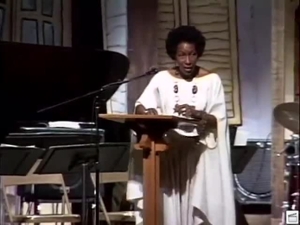Dancing to Her Own Song: A Memorial for Mari Evans
News
by Joanne V. Gabbin
Mari Evans has been part of my life for more than 25 years. At the Furious Flower Poetry Conference in 1994 (pictured right), she was one of the first writers to receive the Lifetime Achievement Award, and three years later I convinced her to join the Wintergreen Women Writers Collective, a group that has been meeting annually since 1987. As a Wintergreen Woman, Evans contributed “My Father’s Passage” to the 2009 collection of essays, Shaping Memories: Reflections of African American Women Writers. During the editorial process for that book I read some of her unpublished writing that helped me to understand the importance of music to her; written in about 2005, it gives a rare glimpse into Evans’ very private life, so I’m including an excerpt here.
When I was twelve, I realized that music was language. That it spoke my most private thoughts. That when I was furious at my beloved single-parenting father, I could attack him, could express that fury with music that spoke my all-encompassing anger with the kind of violence I could otherwise never display…
But music also quieted me, brought serenity when I wore myself out with crashing chords. I could then speak sunrise and soft winds. Music said what I had no language for and provided me with emotional transitions. I know now that with insightful mentoring and guidance, I had the genes, the “right Stuff” for composing. For that was (is) all I ever wanted to do: Sit at the piano and speak.
I drifted into songwriting… I made my way up the proverbial “rocky mountain,” immigrated to New York with a folder full of songs, found myself standing in a music publishing company’s ante-room for a follow-up appointment, and was studying a particular lead-sheet, when one of two white men standing across the room left his partner, walked where I stood, unceremoniously plucked the lead-sheet from my fingers and, turning on his heels, returned to his partner. I stood there speechless. Seething, without language, too frozen to respond, “What-in-hell?” …
A year, or maybe only moments later, he re-crossed the room, the lead-sheet outstretched. “You will never be a songwriter,” he pronounced. “You can’t write lyrics.” Rage had blurred my eyes; I doubt I saw him rejoin his friend.
Outrageous, arrogant, insulting, white assumptions of superiority again, how-dare-he! All of the above—the world had still not provided me with the requisite profanity—but that was my defining moment. The moment when, involuntarily, words began to move abreast of music, and I eventually began to drift into a world of poetry I had never aspired to enter, for lyrics have always only been the engine that ran alongside my music. Then, and now, it is music that consumes me; music is my Kilimanjaro.
Evans’ persistent pursuit of music is a dominant factor in understanding and appreciating her literary contribution. Her rage at having someone tell her what she couldn’t do predicted her parallel development as a song writer/composer and poet, and in each art form the political significance of her artistic expression was not lost. In a conversation with Val Gray Ward at James Madison University in 1994, Evans describes the political situation in this country as a grotesque pas de deux in which dancers pull and strain against one another in movements of freedom and oppression, power and powerlessness, resistance and compliance. She writes in her 2006 book of essays, Clarity as Concept: a Poet’s Perspective, about our need “for a literature that influences attitudes and concomitantly behavior, a literature that demystifies the systems, allowing us to understand ourselves within them; a literature that delineates the comprehensive nature of our oppression, and the subtlety of our colonization; a flexible literature responsive to all the people, moving when necessary to incorporate itself with music, dance, and art in ways that are not merely creative but committed to the destruction of our psychological bondage” (94).
A member of the Black Arts Movement, Evans was a change agent who did not confuse movement with progress, a poet who danced to her own song. Though I will miss her razor sharpness, her brilliance, her insistence on speaking truth to power, I will miss more her indisputable love for Black people. For her 2007 collection titled Continuum, in the poem “Who Can Be Born Black?” she writes:
Who
can be born black
and not
sing
the wonder of it
the joy
the
challenge …
One of the major tropes in her poetry, song, carries cultural authenticity: the history, the lineage, the pride, the character of our people. Thank you, Mari, for your song.
Joanne V. Gabbin
March 13, 2017
We invite you to access our archive and watch Mari Evans reading her poetry at the 1994 Furious Flower Poetry Conference.
Mari Evans died March 10, 2017 in Indianapolis, Indiana.
Public Visitation:
Sunday, March 19, 2017 at 1pm
Stuart Mortuary
2201 N. Illinois St.
Indianapolis 46208
(317) 925-3000
View this video tribute by the Kentucky University Project on the History of Black Writing:
Maryemma Graham reads “I Am a Black Woman” by Mari Evans

